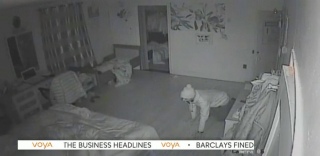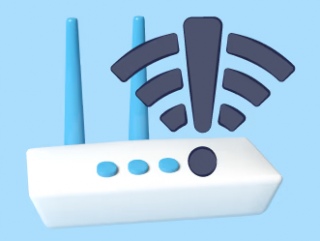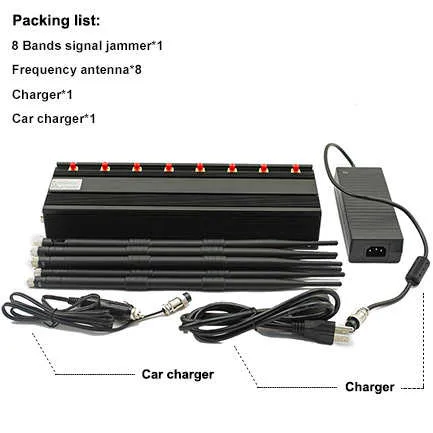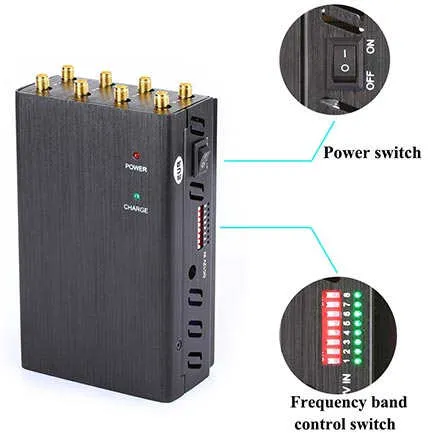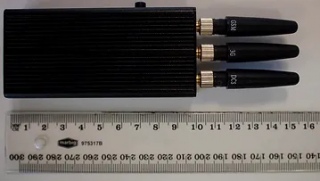Is it feasible for a criminal to disable your alarm system?
How to stop wifi jammer attacks on home security systems
The internet was abuzz with a viral news story from Queens, New York, which showcased a burglar effortlessly sliding across the floor while holding an enigmatic device. According to reports, this device was suspected to be a wifi jammer, strategically employed by the intruder to disable the home's wifi network and render the alarm system inoperable, allowing him to carry out his activities undetected.
Is this even possible? Yes, yes it is.
So what is a wifi jammer?
In essence, these jamming devices generate a frequency that disrupts the functioning of 3G, 4G, 5G, cordless, and wifi networks. Essentially, they affect all of these networks.
The presence of excessive noise disrupts the functioning of devices that rely on those frequencies for their normal operation. This interference extends to emergency networks used by first responders, which is the reason why the use of such devices is deemed illegal. However, these unauthorized devices are produced and traded on the black market, and individuals can potentially create their own. It is strongly recommended not to search for instructions online, as it may lead to being monitored by authorities.
Through the generation of disruptive noise, a signal blocker device disrupts the frequencies utilized by our devices, preventing their proper functioning. This interference extends beyond the intended targets, affecting a significant number of devices.
With this new information in mind, do you foresee any issues with your phones, alarm sensors, alarm base station, smart locks, and wifi cameras? It is a potential risk.
You might be wondering about this: "Andy, my alarm system has a cellular backup for when the wifi goes down. Will it still be functional?" Sadly, the answer is no. The sensors will be unable to establish communication with the base station due to the interference caused by these jammers. It is crucial to keep in mind that these jammers not only disrupt wifi signals but also block mobile spectrums, rendering your base station incapable of making calls over wifi or a cellular network.
How To Stop Wifi Jammer and Deauth Attacks
With knowledge about the nature and outcomes of these attacks, what steps should we take to defend against them? Have you remembered my caution about refraining from showcasing the alarm company branded sign in your yard?
This serves as an explanation as to why it is crucial to keep your home security methods confidential to avoid being targeted by criminals who could exploit your defenses. It is quite simple to identify companies that utilize the 2.4 GHz band.
When selecting new smart home products, ensure they are dual-band or compatible with the 5 gigahertz frequency. I've read about the potential benefits of WPA3 security in preventing these attacks, but as a novice, I cannot confirm its effectiveness. Regrettably, wireless alarm systems are still at risk of jammer attacks.
Select the old-fashioned route by installing a fully wired home alarm system that is connected to a landline. If there are no wireless components, then you should have no issues.
Local storage is a key feature in cameras provided by companies like Ring. This feature allows the cameras to continue recording clips even if there is a wifi outage or cloud storage is not accessible. While you may not receive notifications during such circumstances, you can still access the footage by simply checking the SD card inserted in the camera itself.
To ensure the reliability of your home security, it is recommended to consider adding a cost-effective local storage camera to your existing wifi camera system. By doing so, you can mitigate the risk of losing all footage in the event of a jammer or deauth attack. However, it is crucial to note that if the attackers identify the camera, they may try to vandalize it and take it along.
The internet was abuzz with a viral news story from Queens, New York, which showcased a burglar effortlessly sliding across the floor while holding an enigmatic device. According to reports, this device was suspected to be a wifi jammer, strategically employed by the intruder to disable the home's wifi network and render the alarm system inoperable, allowing him to carry out his activities undetected.
Is this even possible? Yes, yes it is.
So what is a wifi jammer?
In essence, these jamming devices generate a frequency that disrupts the functioning of 3G, 4G, 5G, cordless, and wifi networks. Essentially, they affect all of these networks.
The presence of excessive noise disrupts the functioning of devices that rely on those frequencies for their normal operation. This interference extends to emergency networks used by first responders, which is the reason why the use of such devices is deemed illegal. However, these unauthorized devices are produced and traded on the black market, and individuals can potentially create their own. It is strongly recommended not to search for instructions online, as it may lead to being monitored by authorities.
Through the generation of disruptive noise, a signal blocker device disrupts the frequencies utilized by our devices, preventing their proper functioning. This interference extends beyond the intended targets, affecting a significant number of devices.
With this new information in mind, do you foresee any issues with your phones, alarm sensors, alarm base station, smart locks, and wifi cameras? It is a potential risk.
You might be wondering about this: "Andy, my alarm system has a cellular backup for when the wifi goes down. Will it still be functional?" Sadly, the answer is no. The sensors will be unable to establish communication with the base station due to the interference caused by these jammers. It is crucial to keep in mind that these jammers not only disrupt wifi signals but also block mobile spectrums, rendering your base station incapable of making calls over wifi or a cellular network.
How To Stop Wifi Jammer and Deauth Attacks
With knowledge about the nature and outcomes of these attacks, what steps should we take to defend against them? Have you remembered my caution about refraining from showcasing the alarm company branded sign in your yard?
This serves as an explanation as to why it is crucial to keep your home security methods confidential to avoid being targeted by criminals who could exploit your defenses. It is quite simple to identify companies that utilize the 2.4 GHz band.
When selecting new smart home products, ensure they are dual-band or compatible with the 5 gigahertz frequency. I've read about the potential benefits of WPA3 security in preventing these attacks, but as a novice, I cannot confirm its effectiveness. Regrettably, wireless alarm systems are still at risk of jammer attacks.
Select the old-fashioned route by installing a fully wired home alarm system that is connected to a landline. If there are no wireless components, then you should have no issues.
Local storage is a key feature in cameras provided by companies like Ring. This feature allows the cameras to continue recording clips even if there is a wifi outage or cloud storage is not accessible. While you may not receive notifications during such circumstances, you can still access the footage by simply checking the SD card inserted in the camera itself.
To ensure the reliability of your home security, it is recommended to consider adding a cost-effective local storage camera to your existing wifi camera system. By doing so, you can mitigate the risk of losing all footage in the event of a jammer or deauth attack. However, it is crucial to note that if the attackers identify the camera, they may try to vandalize it and take it along.
